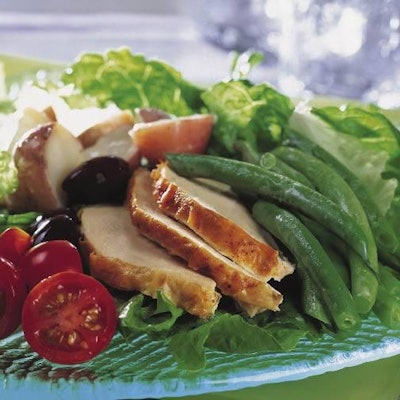
Ready-to-cook (RTC) output and sales volume, marketing programs, facilities and improvements at the USA's 10 largest integrated broiler companies are included in the profiles beginning here. The 10 companies appear in order of ranking based on average weekly RTC production. More USA broiler firms are profiled alphabetically in the story beginning on page 36.
1. Pilgrim's Pride Corporation,
Pittsburg, Texas, produced 181.94 million pounds of ready-to-cook chicken on an average weekly basis in 2006, an increase of 68.94 million pounds or 61 percent from the previous year. The company slaughtered 45.01 million birds per week at an average live weight of 5.17 pounds, according to WATT PoultryUSA rankings data.
Commenting on the company's acquisition of Gold Kist in 2006, Pilgrim's Pride Chairman Lonnie "Bo" Pilgrim said, "We begin 2007 as the preeminent player in the chicken industry, positioned for long-term growth, leadership and value creation for our customers and stockholders."
The company's $7.36 billion in consolidated sales break out 50.1 percent foodservice, 33.3 percent retail and 16.6 percent export. Product forms are 66.1 percent fresh and 33.9 percent frozen; 44.7 percent cut-up; 22.0 percent non-cooked further processed and 12.3 percent cooked. Sales break out 30.3 percent Southeast, 23.2 percent Southwest, 18.0 percent Midwest, 13.5 percent Northeast, 9.4 percent West and 5.5 percent international.
Pilgrim's Pride Corporation employs 56,500 people in operations that include 34 integrated complexes, comprising 52 hatcheries (56.4 million eggs per week capacity), 35 feed mills (355,500 tons per week), 38 slaughter processing facilities, 15 further processing plants (non-cooking), 12 cooking facilities, 39 distribution centers, 10 rendering plants and 28 wastewater treatment plants. The company's rolling stock includes 4,180 vehicles.
Broilers are grown on 5,787 farms in 18,611 houses. The company's breeder flocks are on 1,445 farms in 3,225 houses.
Pilgrim's Pride reported capital improvements in four complexes in 2006. With the installation of high-speed processing lines, capacity was increased 25 percent at the plant in Mayfield, Ky. Capital improvements occurred in IQF operations at the plant in Marshville, N.C. A $70 million, 180,000-square-foot expansion at the plant in Live Oak, Fla., included the installation of air chilling technology. A $30 million, 80,000-square-foot expansion was completed at the plant in Guntersville, Ala.
Springdale, Ark., produced 151.86 million pounds of ready-to-cook chicken on an average weekly basis in 2006, an increase of 1.86 million pounds or 1.2 percent from the previous year. That's based on a slaughter of 42 million birds per week at an average live weight of 4.91 pounds, according to WATT PoultryUSA rankings data.
Richard L. Bond was appointed president and chief executive officer in May 2006, after serving as president and chief operating officer since 2003 and co-chief operating officer and group president of fresh meats and retail since 2001. Mr. Bond was initially employed in 1980 by IBP, Inc., which merged into a wholly-owned subsidiary of Tyson Foods in September of 2001.
Tyson Foods, which is the world's largest meat protein company and the second largest food production company in the Fortune 500, produces, distributes and markets chicken, beef, pork, prepared foods and related allied products. The company reported $7.93 billion in chicken sales in the fiscal year ended September 30, 2006.
Tyson Foods operates 32 broiler complexes, which include 42 hatcheries, 34 feed mills and 53 (three in Mexico and one joint-venture in China) processing plants. The company also owns nine rendering plants with the capacity to produce 29 million pounds of animal protein products per week and 18 ground pet food processing operations in connection with chicken processing plants capable of producing 10 million pounds of product per week. In addition, there are two blending mill operations. The company's broilers, breeders and pullets are produced under contract on 6,628 farms.
In November 2006, the company announced a new business unit, Tyson Renewable Energy, which has been exploring ways to commercialize the company's supply of animal fat into bio-fuels. The potential use of poultry litter to generate energy and other products is also being examined.
The company's Discovery Center, a state-of-the-art R&D facility that includes 19 research centers as well as a USDA-inspected pilot plant, became operational in early fiscal 2007.
Tyson Foods said it expects to establish a joint venture with a poultry company in China in fiscal 2007. Additionally, the company expects to complete a joint venture transaction involving a poultry operation in Brazil.
3. Perdue Farms, Inc.,
Salisbury, Md., produced 56.16 million pounds of ready-to-cook chicken on an average weekly basis in 2006, an increase of 4.83 million pounds or 9.4 percent from the previous year. The company slaughtered 12.77 million birds per week at an average live weight of 5.63 pounds, according to WATT PoultryUSA rankings data.
Company Chairman James A. Perdue, who is the third generation Perdue to run privately-held Perdue Farms, carries on a family tradition by starring in the company's latest commercials, a Goldilocks-themed commercial airing on TV across the Eastern United States. Mr. Perdue continues to show he is a man obsessed with chicken, turning the Goldilocks and the Three Bears fairytale into a story about perfectly sized chicken. The commercials are part of the rollout of a new line of fresh, boneless, skinless chicken breasts, called Perfect Portions, available in all states east of the Mississippi.
Ranked third in sales in the poultry industry, Perdue claims title to the No. 1 brand of fresh chicken in the Eastern United States. The company's $3.4 billion in fiscal 2006 sales break out 66 percent retail, 30 percent foodservice and 4 percent export. Product forms are 75 percent fresh and 25 percent frozen. Brands are Perdue, Shenandoah, Cookin' Good and Gol-Pak.
Perdue Farms employs more than 22,000 associates and partners with more than 2,400 independent farm families. Operations include 18 hatcheries, 12 feed mills, 10 slaughter processing plants, one non-cooking further processing facility, four cooking facilities, two distribution centers and two rendering plants.
In 2006, Perdue Incorporated formed Perdue BioEnergy LLC, a company that will focus on the biofuels industry. "Biofuels are a rapidly growing part of our portfolio, and we will be actively involved in this developing industry," Mr. Perdue said. "Addressing the nation's energy needs through biofuels such as soy biodiesel and ethanol is consistent with our commitment to farmers, to the environment and to agriculture in general."
4. Wayne Farms, LLC,
Division of ContiGroup Companies, Gainesville, Ga., produced 34.90 million pounds of ready-to-cook chicken on an average weekly basis in 2006, an increase of 4.50 million pounds or 14.8 percent from the previous year. The company slaughtered 5.80 million birds weekly at an average live weight of 6.90 pounds, according to WATT PoultryUSA rankings data.
Elton H. Maddox is president and CEO of Wayne Farms, which focuses on the business-to-business (B2B) arena. "This B2B focus frees up resources, money and time that would be spent supporting a branded product to do what we do best delighting our business partners," the company says.
Wayne Farms' $1.1 billion sales in its latest fiscal year break out 48 percent institutional (industrial), 45 percent foodservice, 2 percent retail and 5 percent export. Product forms are 44 percent fresh and 14 percent frozen; 27 percent cooked; and 15 percent raw further processed. Geographically, sales break out 33 percent Southeast, 27 percent Midwest, 19 percent Northeast, 16 percent West, 1 percent Southwest and 4 percent international. Company brands are Wayne Farms, Dutch Quality House and Platinum Harvest.
The company employs 9,250 people in eight integrated complexes, comprising eight hatcheries (7.6 million chicks per week capacity), seven feed mills (43,700 tons per week), eight slaughter processing plants (6.2 million head per week capacity) and five further processing (cooking) plants. The company's rolling stock includes 219 vehicles. Broilers are grown under contract on 807 farms in 2,985 houses. Breeders are on 223 farms in 439 houses.
Wayne Farms is a division of ContiGroup Companies, which was founded in Belgium in 1813 and is one of the largest privately held companies in the United States. ContiGroup focuses on animal proteins and has operations in poultry, pork, cattle feeding and aquaculture.
5. Sanderson Farms, Inc.,
Laurel, Miss., produced 34.65 million pounds of ready-to-cook chicken on an average weekly basis in 2006, an increase of 4.26 million pounds or 14.02 percent from the previous year. The company slaughtered 5.92 million birds per week at an average live weight of 6.91 pounds, according to WATT PoultryUSA rankings data.
According to CEO Joe Frank Sanderson, Jr., the company's focus on four key areas producing a favorable product mix, providing high quality products and excellent service to customers, efficiently managing operations and maintaining a strong financial position allows the company to operate as one of the industry's lowest cost producers.
The company's $1.0 billion sales break out 41 percent retail, 29 percent foodservice, 11 percent institutional, 8 percent export and 11 percent other. Product forms are 87 percent fresh and 13 percent frozen; 94 percent cut-up; and 5 percent non-cooked further processed. Geographically, sales break out 32 percent Southwest, 30 percent Southeast, 22 percent Northeast, 7 percent Midwest, 5 percent West and 4 percent international. The company has 500 different products.
Sanderson Farms employs 8,680 people in six integrated complexes, comprising six hatcheries (8.5 million eggs per week capacity), six feed mills (50,000 tons per week), seven slaughter processing plants (6.9 million birds per week capacity), a cooking plant and six wastewater treatment plants. The company's rolling stock includes 573 vehicles.
The company's broilers are grown under contract on 491 farms in 2,625 houses (7.1 million chicks per week placement capacity). Breeder flocks are on 159 farms in 429 houses (1.9 million bird capacity).
In 2006, the company's new chill-pack plant, feed mill and hatchery in South Georgia reached full capacity. Construction of a new broiler complex is underway in Waco, Texas, and the company expects operations there to begin in 2007.
Selbyville, Del., produced 27.64 million pounds of ready-to-cook chicken on an average weekly basis in 2006, an increase of 2.30 million pounds or 9.1 percent from the previous year. The company slaughtered 4.50 million birds per week at an average live weight of 7.56 pounds, according to WATT PoultryUSA rankings data.
The company's corporate history dates back to 1914, to a commercial feed business in Arkansas called The Hayes Grain and Commission Company. In 1931, the business became known as Cameron Feed Mills. In 1959, Cameron Feed Mills entered into a contractual arrangement with seven Arkansas firms representing various segments of the poultry business. This partnership was incorporated into Mountaire Poultry, Inc., in 1964. In 1971, the companies became known as Mountaire Corporation.
According to Mountaire CEO David L. Pogge, the company's sales of $794 million sales break out 35 percent retail, 30 percent foodservice, 22 percent institutional and 13 percent export. Product forms are 90 percent fresh and 10 percent frozen. Company brands are Mountaire, Sizzlin' Sensations, Lipman and Bo San. The company also packs under private label.
Mountaire Farms employs 6,356 people in three complexes that include three hatcheries (6.4 million eggs per week capacity), four feed mills (38,400 tons per week), three slaughter processing plants (5.3 million head per week capacity) and three wastewater treatment plants.
Broilers are grown under contract on 955 farms in 2,749 houses. Breeder hens and pullets are housed on 168 farms in 323 houses. The company's rolling stock includes 426 vehicles.
7. House of Raeford Farms, Inc. (Poultry Division),
Rose Hill, N.C., produced 20.60 million pounds of ready-to-cook chicken on an average weekly basis in 2006, an increase of 4.57 million pounds or 28.5 percent from the previous year. The company slaughtered 3.64 million broilers per week at an average live weight of 6.67 pounds, according to WATT PoultryUSA rankings data.
Current House of Raeford Chairman Marvin Johnson, has come a long way since he and his brother began selling their parents' homegrown turkeys on the streets of Rose Hill, N.C. After World War II, the Johnson family turned their efforts into a true commercial venture and pioneered the turkey industry in the eastern part of the state. Still a family-owned company, House of Raeford now operates fully integrated facilities from specialized breeding to the production of raw, processed and fully-cooked chickens and turkeys for retail and foodservice customers.
President and COO Don Taber reports $578 million sales of chicken products break out 75 percent foodservice, 13 percent retail and 12 percent export. Product forms are 80 percent fresh and 20 percent frozen; and 44 percent cut-up. The company brands are House of Raeford Farms and Columbia Farms. Geographically, sales break out 82 percent Southeast, 4 percent Midwest, 2 percent Northeast and 12 percent international.
House of Raeford operations include five complexes with four hatcheries (4.4 million eggs per week capacity), four feed mills (39,000 tons per week), five slaughter plants (4.29 million birds per week capacity), two further processing facilities, two cooking facilities and four wastewater treatment plants.
The company purchased the former Circle S Foods turkey plant in Wallace, N.C., in 2005 and converted it to a chicken processing plant in 2006. To support this plant, House of Raeford doubled the size of its Rose Hill, N.C., hatchery and expanded production of the Rose Hill feed mill.
8. Keystone Foods, LLC,
Equity Group - Georgia Division, Huntsville, Ala., produced 19.44 million pounds of ready-to-cook chicken on an average weekly basis in 2006, an increase of 7.67 million pounds or 65.2 percent. The company slaughtered 3.53 million broilers per week at an average live weight of 6.64 pounds, according to WATT PoultryUSA rankings data.
Keith Lewis is senior vice president of the company's poultry division, which acquired the Cagle's, Inc., broiler complex in Kentucky in 2006.
Keystone Foods employs 6,950 people in operations that include three hatcheries (4.13 million eggs per week), three feed mills (25,500 tons per week), three processing plants and two cooking plants. The company's broilers are grown (98 percent under contract) on 295 farms in 1,542 grow-out houses.
9. Koch Foods, Inc.,
Chicago, Ill., produced 18.60 million pounds of ready-to-cook chicken on an average weekly basis in 2006, an increase of 5.31 million pounds or 40 percent from the previous year. The company slaughtered 5.31 million birds at an average live weight of 4.75 pounds, according to WATT PoultryUSA rankings data.
Koch Foods acquired the broiler processing operations of Alabama-based Sylvest Farms, Inc., in 2006. Sylvest, with weekly RTC chicken production of 5.31 million pounds, was ranked No. 27 in WATT PoultryUSA's rankings in 2006.
Joseph C. Grendys is president and CEO of the company that was a one-room chicken de-boning and cutting operation as recently as 1985. Through acquisition and growth, Koch Foods today delivers fresh and frozen products to customers throughout the United States, and its frozen products reach customers around the world.
The company's $1.25 billion in poultry sales break out 75 percent foodservice, 15 percent export, 5 percent retail and 5 percent institutional. Product forms are 25 percent fresh and 75 percent frozen. Products include whole birds, bone-in and boneless chicken breasts and legs, prepared and fully-cooked snacks and entrees. Company brands are Koch Poultry, Antioch Farms, Preferred Foods, Rogers Royal and Mr. Bennies. The company also packs under numerous private labels.
Koch Foods employs over 7,500 people in broiler operations that include four hatcheries, five feed mills and four processing plants.
10. Foster Farms,
Livingston, Calif., produced 17.0 million pounds of ready-to-cook chicken on an average weekly basis in 2006, a decrease of 0.51 million pounds or 2.9 percent from the previous year. The company slaughtered 5.47 million birds per week at an average live weight of 5.37 pounds per bird, according to WATT PoultryUSA rankings data.
CEO and President Ron Foster is the fourth generation of his family to operate the business started in 1939 by Max and Verda Foster. The family-run business has 10,600 employees.
The company's $1.39 billion sales break out 91 percent retail, 6 percent foodservice, 1 percent institutional and 2 percent export. Product forms are 75 percent fresh and 25 percent frozen; 19 percent raw further processed; and 16 percent cooked. Geographically, sales break out 83 percent West, 7 percent Southwest, 3 percent Midwest, 2 percent Northeast and 2 percent international. Foster Farms offers 756 products. The company brands are Foster Farms and Coastal Range.
Foster Farms operations include three complexes, five hatcheries (8.6 million eggs per week capacity), five feed mills (37,720 tons per week), five slaughter processing plants (5.6 million head per week capacity), two further processing facilities, one cooking facility, two distribution centers, two rendering plants and two wastewater treatment plants.
Broilers are grown on 224 farms in 2,275 houses (65 percent of flocks in company-owned housing and 35 percent under contract). Breeder flocks are on 183 farms in 296 houses. The company's rolling stock includes 975 vehicles.



.jpg?auto=format%2Ccompress&fit=crop&h=167&q=70&w=250)













